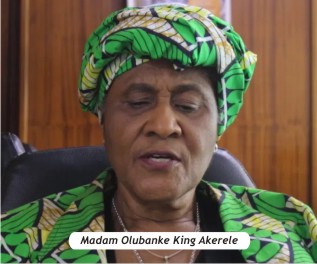The Liberian political landscape is grappling with the aftermath of a Supreme Court opinion on a leadership crisis within the House of Representatives, an opinion that has been met with confusion and calls for clarification. The crux of the issue lies in the removal of House Speaker J. Fonati Koffa by a group of representatives who declared themselves the “majority bloc.” This removal, while supported by a significant number of representatives, was deemed procedurally flawed by some, triggering the legal challenge that landed before the Supreme Court. The Court’s subsequent opinion, while intended to resolve the dispute, has instead generated further uncertainty due to its perceived ambiguity. Former Foreign Minister Olubanke King Akerele has voiced her concerns, highlighting the multiple interpretations of the ruling and the resulting public confusion.
At the heart of the controversy is the Supreme Court’s use of the term “ultra vires,” a legal term denoting actions taken beyond one’s legal authority. The Court declared that certain actions taken by members of the House in the process of removing Speaker Koffa were ultra vires, without explicitly stating which specific actions or which faction within the House had overstepped its authority. This lack of specificity has allowed both sides of the dispute to claim vindication, further muddying the waters and hindering the implementation of the Court’s decision. The Ministry of Justice, tasked with enforcing the ruling, has seemingly sided with the “majority bloc,” adding another layer of complexity to an already convoluted situation.
The ambiguity of the Supreme Court’s opinion has fueled public debate and underscored the need for clear, accessible legal guidance. Akerele, although not a legal expert, stresses the importance of a unified interpretation of the ruling, emphasizing that citizens deserve to understand the implications of such a significant decision. She has called upon professional legal bodies, such as the Liberian National Bar Association, to provide clarity and guidance, and has expressed her desire to meet with President Boakai to discuss the issue further. This proactive approach contrasts with the alleged unresponsiveness of former President Weah, who declined to meet with elders on a similar matter, highlighting the importance of open communication between government and its citizens.
The Supreme Court’s opinion, while shrouded in ambiguity, reaffirmed its constitutional role as the ultimate interpreter of the law and its authority to adjudicate disputes within the legislature. By invoking Articles 33 and 49 of the Liberian Constitution, which govern the composition and operation of the House of Representatives, the Court emphasized the importance of adhering to established legal procedures. The Court’s focus on the “ultra vires” nature of certain actions serves as a reminder that all legislative processes must be conducted within the bounds of the Constitution. This emphasis on constitutional adherence underscores the importance of upholding the rule of law in a democratic society.
The events leading up to the Supreme Court’s intervention reveal a fractured House of Representatives grappling with internal conflicts. The “majority bloc’s” decision to remove Speaker Koffa on grounds of alleged misconduct and incompetence, while supported by a substantial number of representatives, was challenged on procedural grounds. The initial resolution to remove Koffa, followed by a formal vote weeks later, demonstrates the escalating tensions within the House. The Supreme Court’s subsequent involvement highlights the critical role of the judiciary in resolving political disputes and ensuring adherence to constitutional principles.
This ongoing saga within the Liberian House of Representatives underscores the fragility of democratic processes and the importance of clear legal frameworks. The ambiguity surrounding the Supreme Court’s opinion has not only fueled public confusion but also created an environment of uncertainty within the legislature. The calls for clarity from figures like former Foreign Minister Akerele, along with the need for a unified interpretation of the Court’s ruling, highlight the urgency of addressing the current impasse. The future of the House leadership remains uncertain, as the various factions attempt to navigate the legal and political ramifications of the Court’s decision. The situation serves as a stark reminder of the importance of transparency, adherence to due process, and the critical role of the judiciary in upholding the rule of law. The ongoing debate and potential future legal challenges underscore the need for a comprehensive approach to resolving the crisis and ensuring the smooth functioning of the Liberian legislature.














